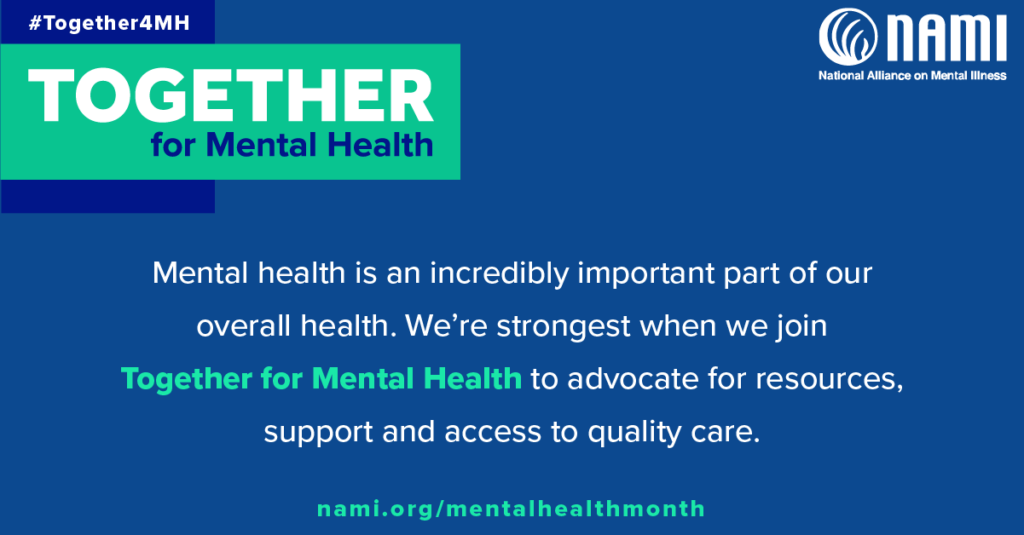Mental Health Awareness Month has been celebrated in the U.S. since 1949. For 2022, the National Alliance on Mental Illness has chosen the theme “Together for Mental Health.”
The stigma surrounding mental health and its treatment persists despite recent emphases by well-known figures such as gymnast Simone Byles and tennis pro Naomi Osaka on the need to prioritize it.
Literature also offers the opportunity for both writers and readers to develop understanding of and empathy for the importance of focusing on mental health. Here are some articles with information and suggestions.
- 10 Books to Read for Mental Health Awareness Month
- Mental disorders aren’t diseases, they’re networks of symptoms
- Tracing the Portrayal of Mental Disorders in Literature Over Time, Through Five Books
- Lauren Beukes No Longer Believes in "The Fairy Tale of Justice"
- Inside Someone Else’s Head: A Conversation with Jennifer Egan
- Beautiful Books: Two psychological masterpieces
- What It Took to Finally Write Honestly About My Mental Illness
10 Books to Read for Mental Health Awareness Month
This list includes reading suggestions for both fiction and nonfiction.
Mental disorders aren’t diseases, they’re networks of symptoms
Richard J McNally, a professor and the director of clinical training in the department of psychology at Harvard University, explains recent advancements in the understanding and treatment of mental health symptoms.
Tracing the Portrayal of Mental Disorders in Literature Over Time, Through Five Books
Physician and novelist Jane Shemilt discusses the history of literary portrayals of mental disorders across five works:
- Macbeth by William Shakespeare (1623)
- Jane Eyre by Charlotte Brontë (1848)
- Mrs. Dalloway by Virginia Woolf (1925)
- The Bell Jar by Sylvia Plath (1963)
- Sorrow and Bliss by Meg Mason (2021)
The five books I describe reflect the age in which they were written; if mental illness is diagnosed by doctors it is also defined by society because society decides what makes behaviour unusual, undesirable or even ‘mad.’
Lauren Beukes No Longer Believes in “The Fairy Tale of Justice”
Crime writer Lauren Beukes wrote The Shining Girls, the basis for the streaming drama of the same name now running on Apple TV+. The TV series stars Elisabeth Moss, a newspaper researcher “suffering the aftershocks of a brutal attack that’s left her permanently scarred, both physically and psychologically.”
Beukes says in this interview that people who have lived through their own traumas sometimes come up to her after readings and say, “I went through something, and I just want to let you know that the way you wrote about it is absolutely true.” Beukes hopes “people see some of the resilience and the uncertainty that people suffering from trauma have experienced.”
Inside Someone Else’s Head: A Conversation with Jennifer Egan
Jennifer Egan talks with Rachel Barenbaum about Egan’s recently published novel The Candy House:
Solitude interests me enormously because it’s our natural state as humans. I think we struggle against it all the time. We also struggle with self-presentation. As we leave that state of solitude and present ourselves to the world, we use all sorts of deceptions. We often don’t want to reveal things about ourselves. We have secrets, and as much as I am interested in solitude, I am interested in secrets — and shame. For example, addiction comes up again and again in my work because addiction requires constant deception. I’m fascinated by that.
The novel, Egan says, “raises the questions: Do we really want to know what it’s like to be inside someone else’s head? Isn’t that just a little too intimate?”
Beautiful Books: Two psychological masterpieces
Book blogger Lory discusses The Haunting of Hill House by Shirley Jackson and The Bell Jar by Sylvia Plath, two primary examples of psychological literature. Both books have recently been released “in beautiful new editions by The Folio Society.” Lory touches on how the design and illustration of each novel contributes to communicating the novel’s content.
What It Took to Finally Write Honestly About My Mental Illness
Joanne Greenberg, who published her novel I Never Promised You a Rose Garden under a pseudonym (Hannah Green) in 1964, discusses why she chose to hide her identity (“my mother had asked me to, in order to protect the family” from the stigma of her mental illness) and later chose to reveal it.
© 2022 by Mary Daniels Brown


I remember reading I Never Promised You a Rose Garden when I was in high school, a very powerful experience.